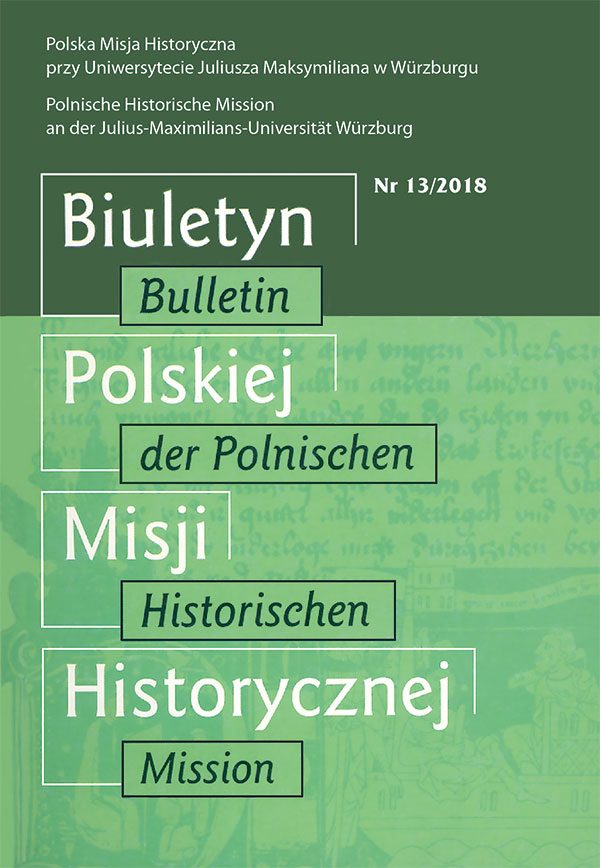Treating Religious Minorities by King Frederick II of Prussia (1712-1786) on the Example of the Polish Brethren
DOI:
https://doi.org/10.12775/BPMH.2018.007Keywords
• Frederick II of Prussia (1712–1786), religious politics, religious minorities, SociniansAbstract
The article analyzes the religious policy of the Prussian king Frederick II on the example of the Polish Brethren. In the first part, the author, on the basis of Frederick’s writings, discusses the king‘s way of understanding religion and denomination issues. The next problem addressed in the article is how King Frederick II of Prussia dealt with the Jews, Catholics and Mennonites. The main part of the article constitutes the description of privileges and coercive measures used in relation to the Polish Brethren on the example of the king’s reaction to their motion to obtain permission for the construction of a house of prayer.
References
Źródła archiwalne / Archivalische Quellen / Archival Sources
Geheimes Staatsarchiv Preußischer Kulturbesitz in Berlin. HA, Rep. 7 Preußen, Nr. 68, Paket 961, S. 462–467 und S. 468–485,
Geheimes Staatsarchiv Preußischer Kulturbesitz in Berlin. XX. HA, EM 38d Nr. 74.
Źródła drukowane / Gedruckte Quellen / Printed Sources
Borowski L. E., Neue Preußische Kirchenregistratur, die neuern Verordnungen und Einrichtungen in Kirchen. und Schulsachen im Königreiche Preußen enthaltend. Nebst einigen zur Kirchengeschichte im Königreiche Preußens gehörigen Aufsätzen, (1773).
Friedrich II. von Preußen, Das politische Testament (1752), in: Die Werke Friedrichs des Großen. In deutscher Übersetzung, hg. v. G. B. Volz, 7 (1913).
Friedrich II. von Preußen, Denkwürdigkeiten zur Geschichte des Hauses Brandenburg, in: Die Werke Friedrichs des Großen. In deutscher Übersetzung, hg. v. G. B. Volz, 1 (1913).
Friedrich II. von Preußen, Politisches Testament (1768), in: Die politischen Testamente der Hohenzollern, bearb. v. R. Dietrich, (1986).
Literatura / Literatur / Literature
Asche M., Neusiedler im verheerten Land. Kriegsfolgenbewältigung, Migrationssteuerung und Konfessionspolitik im Zeichen des Landeswiederaufbaus, (2006).
Birtsch G., Friedrich der Große und die Aufklärung, in: Friedrich der Große in seiner Zeit, hg. v. O. Hauser, (1987), S. 31–46.
Bömelburg H.-J., Konfession und Migration zwischen Brandenburg-Preußen und Polen-Litauen 1640–1772. Eine Neubewertung, in: Glaubensflüchtlinge. Ursachen, Formen und Auswirkungen frühneuzeitlicher Konfessionsmigration in Europa, hg. v. J. Bahlcke, (2008), S. 119–144.
Bömelburg H.-J., Zwischen polnischer Ständegesellschaft und preussischem Obrigkeitsstaat. Vom königlichen Preussen zu Westpreussen (1756–1806), (1995).
Bringmann W., Friedrich der Große. Ein Porträt, (2006).
Die Politischen Testamente der Hohenzollern, bearb. v. R. Dietrich, (1986).
Die evangelische Kirche der Union. Ihre Vorgeschichte und Geschichte, hg. v. W. Elliger, (1967).
Heinrich G., Religionstoleranz in Brandenburg-Preußen. Idee und Wirklichkeit, in: Preußen. Beiträge zu einer politischen Kultur, hg. v. M. Schlenke, 2 (1981), S. 61–88.
Jacobson H. F., Ueber die Arten der Religionsgesellschaften und die religiösen Rechtsverhältnisse der Dissidenten in Preussen, in: Zeitschrift für Kirchenrecht, 1 (1861), S. 392–443.
Korff G., Preußen. Versuch einer Bilanz, (1981).
Luh J., Zur Konfessionspolitik der Kurfürsten von Brandenburg und Könige von Preußen (1640–1740), in: Ablehnung – Duldung – Toleranz. Toleranz in den Niederlanden und Deutschland, ein historischer und aktueller Vergleich, hg. v. H. Lademacher, (2004), S. 306–324.
Salatowsky S., Die drohende Gefahr des Atheismus. Die Sozinianer Przypkowski und Crell über die möglichen Folgen von Intoleranz, in: Duldung religiöser Vielfalt – Sorge um die wahre Religion. Toleranzdebatten in der Frühen Neuzeit, hg. v. S. Salatowsky u.a., (2016), S. 99–127.
Salatowsky S., Dürfen Sozinianer geduldet werden? Obrigkeitliche und theologische Debatten in Brandenburg und Preußen im 17. und 18. Jahrhundert, in: Religiöser Nonkonformismus und frühneuzeitliche Gelehrtenkultur, hg. v. F. Vollhardt, (2014), S. 223–250.
Schenk T., Wegbereiter zur Emanzipation? Studien zur Judenpolitik des „Aufgeklärten Absolutismus“ in Preussen (1763–1812), (2010).
Schröder N., Friedrich der Große und die Unitarier – eine Geschichte der Toleranz?, in: Von Emerson zu Thomas Mann. Beiträge zur Geschichte des Denkens in Amerika und Deutschland, hg. v. D. McKanan, H. Detering, (2017), S. 33–43.
Schwartz P., Unitarier in der Neumark, in: Schriften des Vereins für die Geschichte der Neumark, 10 (1910), S. 61–72.
Sembrzycki J., Die polnischen Reformierten und Unitarier in Preußen, in: Altpreussische Monatsschrift. Neue Folge, 30 (1893), S. 1–100.
Walz R., Die Ansiedlung der Salzburger Emigranten in Ostpreußen, in: Probleme der Migration und Integration im Preußenland vom Mittelalter bis zum Anfang des 20. Jahrhunderts, hg. v. K. Militzer, (2005), S. 87–104.
Wannicke W., Die Vertreibung der Sozinianer aus Polen und ihre Ansiedlung im Reich, Magisterarbeit (1994).
Wilbur E. A., A History of Unitarianism. Socinianism and its Antecedents, 1 (1947).
Wotschke T., Die unitarische Gemeinde in Meseritz-Bobelwitz, in: Zeitschrift der Historischen Gesellschaft für die Provinz Posen, 26 (1911), S. 161–223.
Downloads
The publisher's shop:
Published
How to Cite
Issue
Section
License
The author submitting the text for publication is obliged to disclose all authors involved in the preparation of the text and (if applicable) an indication of the sources of financing of the publication, the contribution of scientific research institutions, associations and other entities ("financial disclosure").
In the case of texts prepared by two or more Authors, the Authors are obliged to send to the Editorial Staff a statement about the contribution of individual Authors to the publication (including their affiliation and an indication of the Author / Authors of the concepts, assumptions, methods, etc.). The main responsibility for the text lies with the author submitting it to the Editorial Board.
Please be advised that the editors of the Bulletin of the Polish Historical Mission are using the iThenticate anti-plagiarism program, since 2016 each article has been checked for authenticity. The editors declare that detected cases of scientific misconduct will be documented and made public by notifying relevant entities (institutions employing Authors, scientific institutions and associations, etc.).
Authors / Authors are asked to send the following documents to the Editor:
- declaration of the Author or Authors,
- statement of the Author or Authors,
- basic information about the article.
Universität Würzburg
Polnische Historische Mission
Philosophiegebäude
Am Hubland
97074 Würzburg, Germany
Stats
Number of views and downloads: 1256
Number of citations: 0



